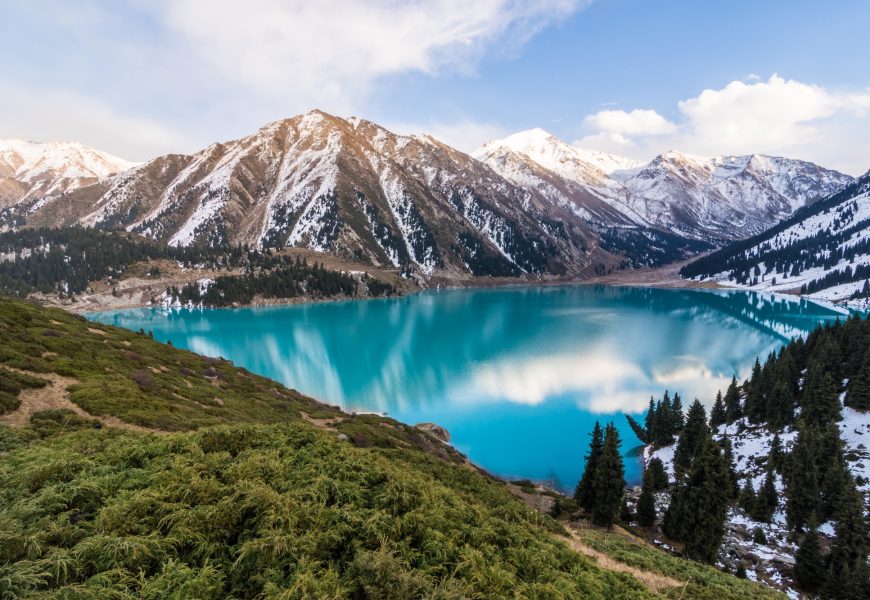Kazakhstan, the world’s ninth-largest country, offers travelers a rich tapestry of experiences, from its vast steppes and towering mountains to its modern cities and ancient traditions. As a nation that bridges Europe and Asia, Kazakhstan presents a unique blend of cultures, histories, and landscapes waiting to be explored.
Top Destinations
Astana (Nur-Sultan): The capital city is renowned for its futuristic skyline, featuring architectural marvels like the Bayterek Tower and the Khan Shatyr Entertainment Center. Astana’s modernity reflects Kazakhstan’s aspirations and rapid development.
Almaty: As the country’s largest city, Almaty boasts a vibrant cultural scene, bustling markets, and proximity to natural attractions like the Medeu ice rink and Shymbulak ski resort. The city’s leafy avenues and café culture make it a delightful place to unwind.
Charyn Canyon: Often dubbed the “Grand Canyon’s little brother,” Charyn Canyon offers breathtaking views and hiking opportunities amidst its dramatic red sandstone formations.
Lake Balkhash: One of the world’s largest lakes, Balkhash is unique in that half of its water is fresh, and the other half is saline. It’s a serene spot for fishing, swimming, and experiencing Kazakhstan’s natural beauty.
Culinary Delights
Kazakh cuisine reflects its nomadic heritage, emphasizing meat and dairy products. Here are some traditional dishes to savor:
Beshbarmak: Considered the national dish, beshbarmak consists of boiled meat (often lamb or horse) served over flat noodles, accompanied by an onion broth. The name translates to “five fingers,” highlighting the traditional method of eating it by hand.
Kazy: A delicacy made from horse meat sausage, kazy is often served during festive occasions and reflects the deep-rooted equestrian culture of Kazakhstan.
Baursak: These fluffy, deep-fried dough balls are a popular snack or dessert, often enjoyed with tea or dipped in honey.
Kumys: A traditional beverage made from fermented mare’s milk, kumys has a slightly sour taste and is cherished for its purported health benefits.
Cultural Etiquette: Do’s and Don’ts
To ensure a respectful and enriching experience in Kazakhstan, consider the following:
Do’s:
Greet with a Handshake: When meeting someone, a firm handshake accompanied by a smile is customary.
Accept Hospitality: Kazakh people are known for their generosity. If offered food or drink, it’s polite to accept, even if only in small amounts.
Dress Modestly: Especially in rural areas and religious sites, opt for conservative attire to show respect for local customs.
Don’ts:
Avoid Pointing with the Finger: Using your finger to point can be considered impolite; instead, gesture with your whole hand.
Refrain from Public Displays of Affection: While holding hands is generally acceptable, more intimate gestures may be frowned upon in public spaces.
Don’t Refuse Food Multiple Times: If you’re full, it’s polite to accept a small portion when offered, as declining repeatedly can be seen as impolite.
Travel Tips
Language: Kazakh and Russian are the official languages. Learning basic phrases in either can enhance your interactions.
Currency: The local currency is the Tenge (KZT). While credit cards are widely accepted in cities, carrying cash is advisable when traveling to remote areas.
Transportation: Kazakhstan’s vastness makes domestic flights a convenient option. Trains and buses are also available for intercity travel, offering a chance to witness the country’s diverse landscapes.
Embarking on a journey through Kazakhstan promises a blend of adventure, cultural immersion, and warm hospitality. Whether you’re exploring its modern urban centers or the tranquil expanses of its natural wonders, Kazakhstan offers a travel experience like no other.
Sources:


